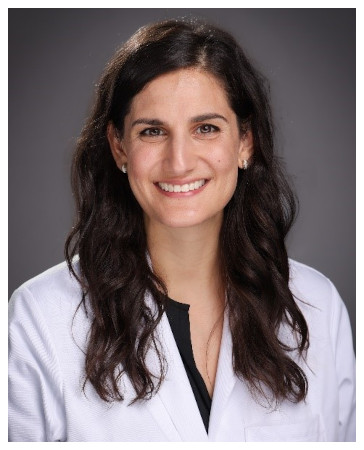
Naseem Alavian, MD, MPH, is a fellow in infectious disease and health services researcher in the Duke University School of Medicine. Dr. Alavian leverages data science in her research to develop and implement innovative strategies for improving disease management in patients living with HIV in the US South. In this interview, we delve into Dr. Alavian’s journey through medical school, her connection with health care services research, and how she integrates her clinical expertise with socio-behavioral research to enhance HIV care.
Dr. Naseem Alavian credits her mentors from her undergraduate years at the University of Virginia for nurturing her interest in bridging social sciences, human biology, and community-based research. Although she initially aimed to pursue a career in epidemiology based on her public health field work in Ecuador and Uganda, her experiences in medical school led her to fall in love with clinical medicine, ultimately altering her trajectory.
After completing her residency in Medicine and Pediatrics at Texas Children’s Hospital/Baylor College of Medicine and serving as Chief Medical Resident in Houston, Texas, Dr. Alavian was eager to engage directly with patients in a clinical role. This led her to the University of North Carolina (UNC), where she began an Assistant Professor position focused on education and direct patient care. However, she still hoped for a community-facing role in healthcare in which she could engage more directly with the environment where patients live and apply her training in public health.
During the pandemic, Dr. Alavian became the Service Line Leader of the COVID-19 Unit at UNC. Working closely with infectious disease providers solidified her interest in the field. She then moved to Duke University to start her Infectious Disease Fellowship. Despite her extensive experience in global health, she was drawn to her mentors who specialized in domestic HIV research, especially in health services.
Dr. Alavian’s clinical and research training, supported by the Duke Interdisciplinary Research Training Program in AIDS (IRTPA) T32, allows her the time and freedom to develop skills in HIV health service research. Dr. Alavian explains that health service research ties together her interests in quality improvement with patient-centered solutions and public health. She aims to understand how patients experience health and how providers and health systems can optimize health care delivery, including actions outside the traditional health care system to improve access. Her current research uses novel approaches to optimize the HIV care continuum, particularly focusing on HIV care engagement, which dually improves individual health outcomes and reduces transmission at the population level—a significant challenge in the US South.
In 2023, Dr. Alavian received CFAR Pilot funding for her project titled, “HIV Care Engagement: Identifying Predictors of Engagement and Building a Collaboration with the Durham County Health Department.” Her research aims to inform the development and implementation of a health system-based strategy to improve care engagement among people living with HIV (PWH) with the hope that such a program could be disseminated across the region. By improving retention of PWH on life-saving antiretroviral therapy, the project seeks to reduce HIV morbidity and mortality, decrease new HIV incidences, and contribute to ending the HIV epidemic.
CFAR SBS Core Consultations have been instrumental in helping Dr. Alavian develop a comprehensive, equitable, and easy-to-implement HIV re-engagement program that includes patient perspectives, needs, and expectations. QualCore also assisted in developing interview models and guides to understand the perspectives of key clinical players, aiming to provide integrated social services, such as mental health care, alongside HIV care.
Dr. Alavian values the bi-directional conversations with SBS Consultations, which help her think through novel approaches and consider the nuanced aspects of complex problem-solving that qualitative research and data can illuminate. She notes that these interactions leave her with a better understanding of socio-behavioral and qualitative research principles, which she intends to integrate into her future projects. She also appreciates that the SBS Core provides resources for linking quantitative research with social-behavioral foundations, which is especially valuable for young and early-stage investigators. She praises the QualCore staff for their professionalism, knowledge, and generosity with their time, stating that these rich experiences have significantly shaped her research approach. “As a young investigator, to have these types of rich experiences early-on has shaped the way I think about including qualitative research into new ideas.”